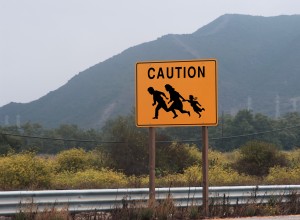“So God created humankind in his image, in the image of God he created them; male and female he created them…God saw everything that he had made, and indeed, it was very good” (Genesis 1:27, 31)
“But our citizenship is in heaven, and it is from there that we are expecting a Savior, the Lord Jesus Christ.” (Philippians 3:20)
This summer I’ve dived into immigration conversation and have been shocked, appalled, frustrated, but also hopeful at some of the things I’ve experienced. Immigration is a complex situation that spans from language issues, to legal issues, to family issues. It is also elicits some of the most heated opinions I’ve ever witnessed. It has been a struggle for me to reconcile some of the things I’ve heard from people I respect with the real experience of many immigrants, documented or undocumented.
Evoking the civil rights movement might sound cliche, but the situation is very reminiscent of the struggles for equal rights in the 60s and 70s. Upon reflection on my experiences this summer, two issues resonate with me: the human rights of these immigrants and the portrayal of their situation by the media which directly relates to whether they are seen as humans with inherent dignity and worth.
In 1970, during the tumultuous civil rights movement, nineteen students were arrested outside of Plain, Mississippi for taking part in a protest for equal employment. Their teacher and organizer, John M. Perkins, went to the jail they were being kept in to advocate for them but was also arrested and subsequently beaten and tortured because he was a black man standing up for equal rights.
Perkins was not a criminal, yet he was treated like one. Immigrants aren’t criminals, but they are often portrayed as such in the media. Indeed, my own sense of the issue was certainly flavored by what I saw on the news. For all I knew, most “illegal” immigrants jumped over the fence somewhere on the border. I believed that most Latinos were  immigrants, documented or otherwise. Immigration was a Latino issue because all the “illegals” come from Latin America.
immigrants, documented or otherwise. Immigration was a Latino issue because all the “illegals” come from Latin America.
The media’s rhetoric surrounding immigration breeds fear. For example, according to Bill O’Reilly “the culture from which they [immigrants] come is a lot more violent than the USA.” According to Glenn Beck, “Recent investigations showed that in Los Angeles 95 percent of all warrants for homicide targeted illegal aliens.” However, a study conducted by researchers from Harvard University and the University of Michigan revealed both that immigrants committed fewer crimes than native-born citizens, and that a greater proportion of immigrants in a neighborhood was associated with lower rates of crime.
Even the term “illegal alien” automatically labels immigrants as criminals, foreign invaders, something to be feared. And it seems as though the language of fear has succeeded: in my conversations recently, people have either hinted at or said outright that because they are here “illegally,” the immigrants do not have the same rights as others in the US.
Many immigrants come here legally with a visa. After building relationships here, working here, starting families here, they apply for another visa. However, while their application is being processed their current visa expires. They are left with an impossible choice of leaving their community, family, and job or stay here “illegally” while their application is up in the air. Yes, some “jump the fence” but that certainly is not how many immigrants get here.
Additionally, many Latinos are US citizens. I reported last month that I was surprised to learn that the majority of Latinos in NC are here legally or are US citizens. Yet because of their ethnicity they are treated differently. In 2011, total Irish immigration increased about 12 percent. However, undocumented Irish immigrants had little trouble finding work in New York City. Racial profiling is a very real aspect of the immigration situation when Latino US citizens are asked for their citizenship papers but undocumented European immigrants are embraced.
The way we talk about immigration, even the very language we use, causes us to never once think of these people as humans, created in the image and likeness of God. Even if they aren’t citizens of the United States, they are citizens of heaven. What is more important? Even if they are labeled “illegal aliens” they are still created in the image of God. What is more important?
The civil rights movement of the 60s and 70s, held these biblical truths and helped people realize the fallenness of segregation and racism. Let us once again turn to these truths in order to ensure that all people are treated with human dignity, regardless of skin color or immigration status. Let our language and our portrayal of immigrants reflect these truths.
-Tim Hetzel, Duke Divinity Intern

